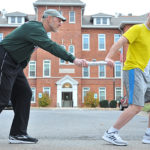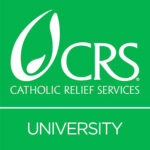Sixty-million of God’s people around the world are now without a home or in fear of being homeless because of war, poverty, terrorism and other forms of violence. Our culture gives them different titles: refugees and undocumented immigrants. Why aren’t we calling them brothers and sisters of the God we call Father? Why aren’t we reaching out, especially in this Year of Mercy, to give them refuge?
Our government says there’s a big difference between the two groups. Refugees have documented proof of their imperiled lives. The undocumented immigrants are deemed to be lawbreakers because they don’t have documented proof. But do the bureaucrats who receive our tax dollars to implement the law take time to listen to the stories, to understand why people feel compelled to seek refuge in our cities and towns?
Not in the minds of the Catholic Legal Immigration Network Inc. (CLINIC), or the U.S. Conference of Catholic Bishops (USCCB). Both groups issued press releases last week decrying a planned increase in federal immigration raids. On May 24, Immigration and Customs Enforcement (ICE) personnel deported a mother and her 14-year-old daughter, both of whom feared for their lives. “… None of ICE’s actions show any kind of concern by the Obama Administration about their family’s due process rights,” the CLINIC press release states. “This family is just the latest in the string of lives destroyed by a government that refuses to administer our refugee protection system with the care it requires.” Where is the mercy?

Meanwhile, a Congolese refugee family now has temporary living arrangements in Iowa City with help from the Davenport Diocese’s Social Action Office. Kent Ferris, who oversees the office and Catholic Charities for the diocese, put extraordinary effort into collaborating with other agencies, as well as an already existing refugee community and parishioners in Iowa City to assist this family. That’s mercy in action.
Another example of mercy in action: Ten Midwest communities of Catholic sisters, including from the Davenport Diocese, are launching a public awareness campaign to welcome refugees. Their campaign features billboards in Clinton, Davenport, Des Moines and Dubuque in Iowa and in Wisconsin and Omaha, Neb. Prayer services near some of the billboard sites will be scheduled later. The billboards bear the message “I was a stranger a refugee and you welcomed me” and will remain posted through June and July. The billboard may look familiar to some of you. The sisters previously sponsored a public awareness campaign with the same billboards, focusing on welcoming the immigrant. Perhaps the sisters could have featured both “immigrant” and “refugee” on the billboard. A representative for the sisters wisely observes: “Jesus said, ‘Welcome them all.’”
The sisters also are sending postcards to government officials at the local, state and federal level to encourage them to “speak out against fear-mongering and inflammatory rhetoric about refugees” and to “oppose any legislation that would block resettlement of refugees of any nationality or religion in the United States of America.” Call Lisa Martin, communications director for the Congregation of the Humility of Mary, to obtain postcards: (563) 336-8404.
Earlier this spring, the Iowa Legislature approved a bill to expand the RefugeRISE AmeriCorps program aimed at the economic wellbeing and health of refugees. This program prepares current refugees in Iowa for jobs with Iowa employers, especially in rural areas where there’s a critical need for trained workers, supporters say. But there’s a short window of opportunity in which to secure $650,000 in federal dollars to match $350,000 in state dollars for this program. Contact Gov. Terry Branstad’s office to let him know this is a worthwhile use of funds, even with a tight budget.
The U.S. Conference of Catholic Bishops’ website notes the many needs of refugees – food, clothing, shelter, employment and English as a Second Language classes among them. The same is true for undocumented immigrants fleeing from Central America and other places plagued by violence.
In his letter explaining the Extraordinary Jubilee of Mercy, Pope Francis said: “It is time to return to the basics and to bear the weaknesses and struggles of our brothers and sisters. Mercy is the force that reawakens us to new life and instills in us the courage to look to the future with hope.”
Sixty-million of our brothers and sisters on this earth are crying out for help. Let’s show them mercy by enlarging our family circle.
Barb Arland-Fye, Editor










